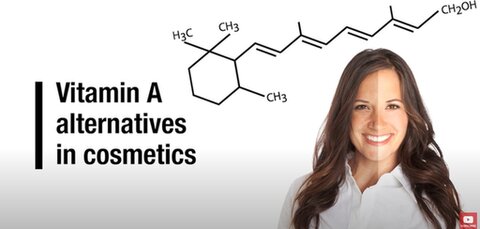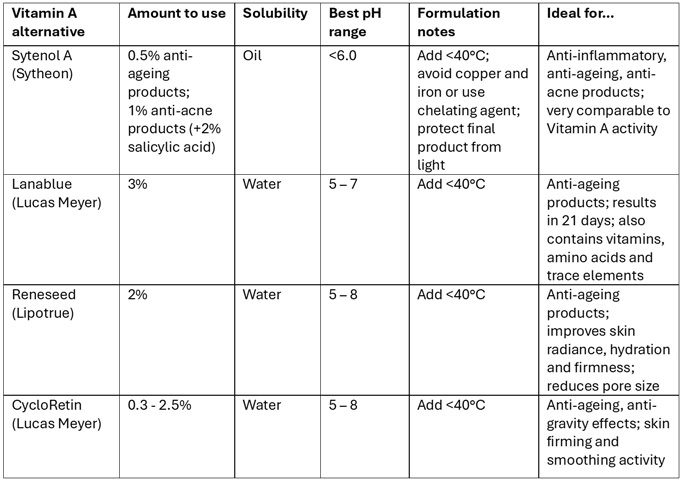COLUMN: HOW TO FORMULATE
Retinol Alternatives
KEYWORDS — Retinol alternatives; vitamin A; vitamin A alternatives; skin renewal; vitamin A regulations; vitamin A safety.
Retinol, or more commonly vitamin A, may also be known in cosmetic products as vitamin A palmitate, retinyl palmitate, retinal, retinaldehyde or retinyl acetate. It may also be used in therapeutic products in the form of tretinoin or retinoic acid and its salts. It has been clinically proven in multiple studies to provide significant anti-ageing, anti-wrinkle and cell renewal benefits. However, it is notoriously hard to stabilise in cosmetic formulas and can be very irritating to some skin types. It also has varying regulatory limits around the world, making it very difficult to use with confidence in skincare formulas for multiple skin types in various regions.
The solution? Retinol alternatives. These are largely plant based extracts with vitamin A-like activity, and their clinical efficacy is often proven by running comparison tests with vitamin A based formulas. This article will introduce you to the retinol alternatives available to boost your anti-ageing and skin renewal formulas without the risk of irritation, regulatory restrictions or poor shelf life so common when formulating with standard retinol or its derivatives.
What’s wrong with vitamin A?
First, here is a short summary of the issues when formulating with vitamin A, retinol or its derivatives
- Regulations vary around the world, and need to be checked regularly in case the limits change. For example, the limits range from 0.05%w/w retinol equivalents (RE) in body lotion or 0.3%w/w RE in other types of cosmetics in the EU up to 1%w/w RE in Australia and 1%w/w RE in other cosmetics in Canada.
- Usually requires a pH of 6 - 7 to remain stable throughout the shelf life of the product. Exceptions where the retinol or derivative is provided in an encapsulated or liposomal form may apply, and enable broader formulation ranges so long as they encapsulation or protective method is not broken during manufacture.
- Is oil soluble and needs an antioxidant to ensure it maintains a suitable shelf life and efficacy.
- Is a known irritant for many users, especially those with sensitive skin.
It is also commonly available as a synthetic material, meaning it is largely unsuitable for use in formulas promoted as containing natural actives or ingredients.

What vitamin A alternatives are available?
Thankfully, technology and suppliers can now provide us with various natural alternatives to using vitamin A in formulas, still with the same anticipated efficacy and results consumers are looking for.

One of the most widely known vitamin A alternatives available is Sytenol A (DKSH), more commonly referred to as Bakuchiol. It was the first natural vitamin A alternative with efficacy demonstrated to be not only comparable to vitamin A, but instead preferred, because Bakuchiol actually has anti-inflammatory properties. There are now multiple suppliers of bakuchiol oils; make sure you look for efficacy data from your supplier if it is not the original DKSH product. It is oil soluble, but only needs a small input to be effective, making maintaining long term stability in a water based product relatively easy. It is naturally derived from a component of the Psoralea corylifolia extract and suits formulas where the pH is less than 6.
Lanablue (Lucas Meyer) is another popular vitamin A alternative. It is Aphanizomenon Flos-aquae extract,sourced from North American algae, and is water soluble. It not only provide vitamin A equivalent anti-ageing results in as little as 21 days, it also contains a variety of vitamins, amino acids and trace elements to promote skin cell renewal and a smoothing effect. It is stable over a pH range of 5 - 7 to suit a broad range of anti-ageing and skin renewal formulas.
Reneseed (Lipotrue) is a plant-synthesised peptide with proven vitamin-A results in anti-ageing products. It has been clinically proven to improve skin radiance and hydration, boost firmness of the skin and reduce pore size. It is stable over a relatively broad pH range of 5 - 8 and is water soluble, making its addition to a variety of anti-ageing creams and serums ideal.
A relatively new entry to the market, CycloRetin (Lucas Meyer Cosmetics) contains a unique cyclic peptide derived from the Pseudostellaria heterophylla plant. With vitamin-A mimicking activity, this active not only provides skin firming but also an anti-gravity action to lift sagging skin. It too is stable over a broad pH range and is water soluble for greater formulating flexibility.
Here is a summary table to help you choose and compare:

Speak with your suppliers about their retinol alternatives as their performance makes a non-irritating, highly efficacious addition to all anti-ageing cosmetic formulas.
Happy formulating!
